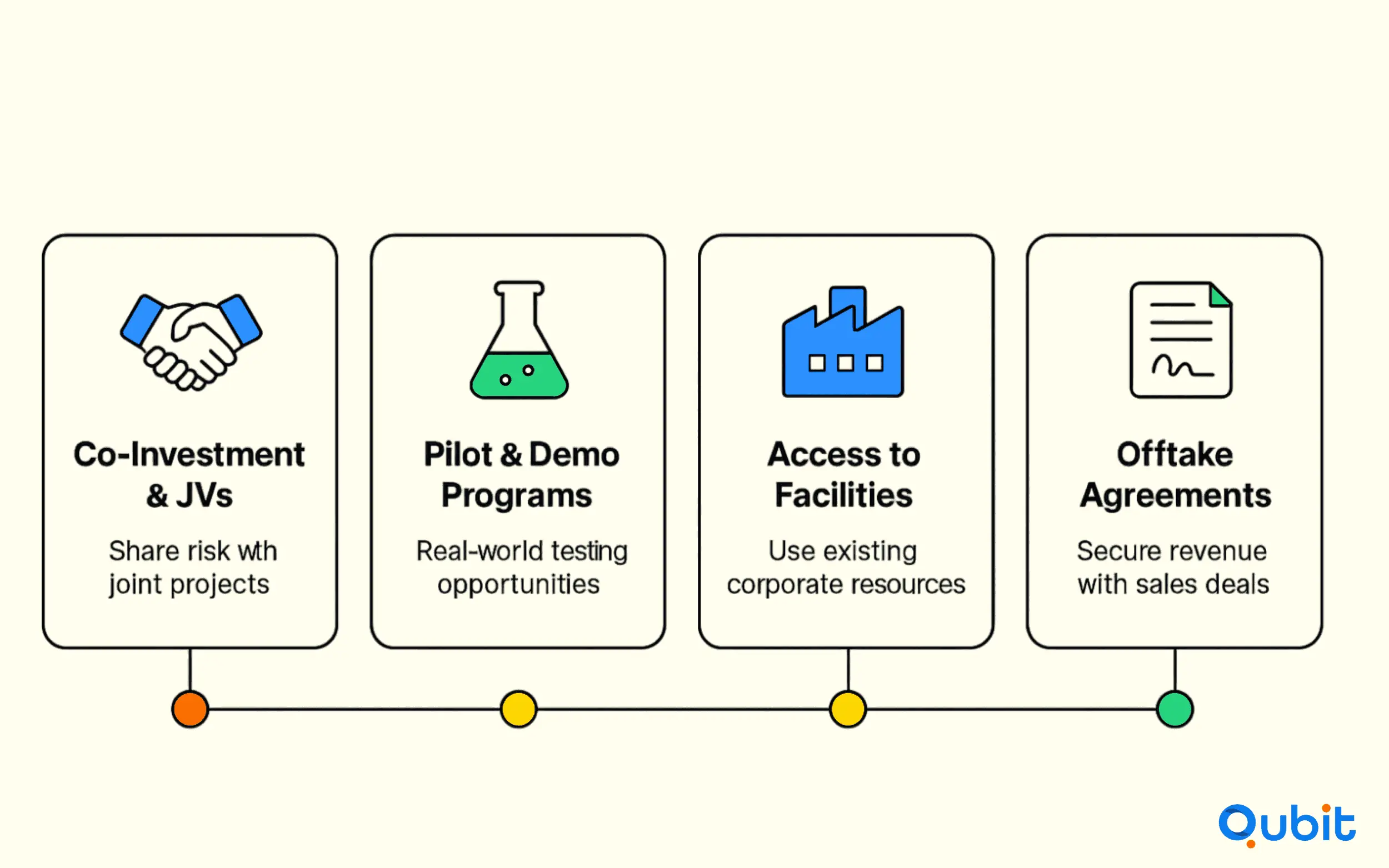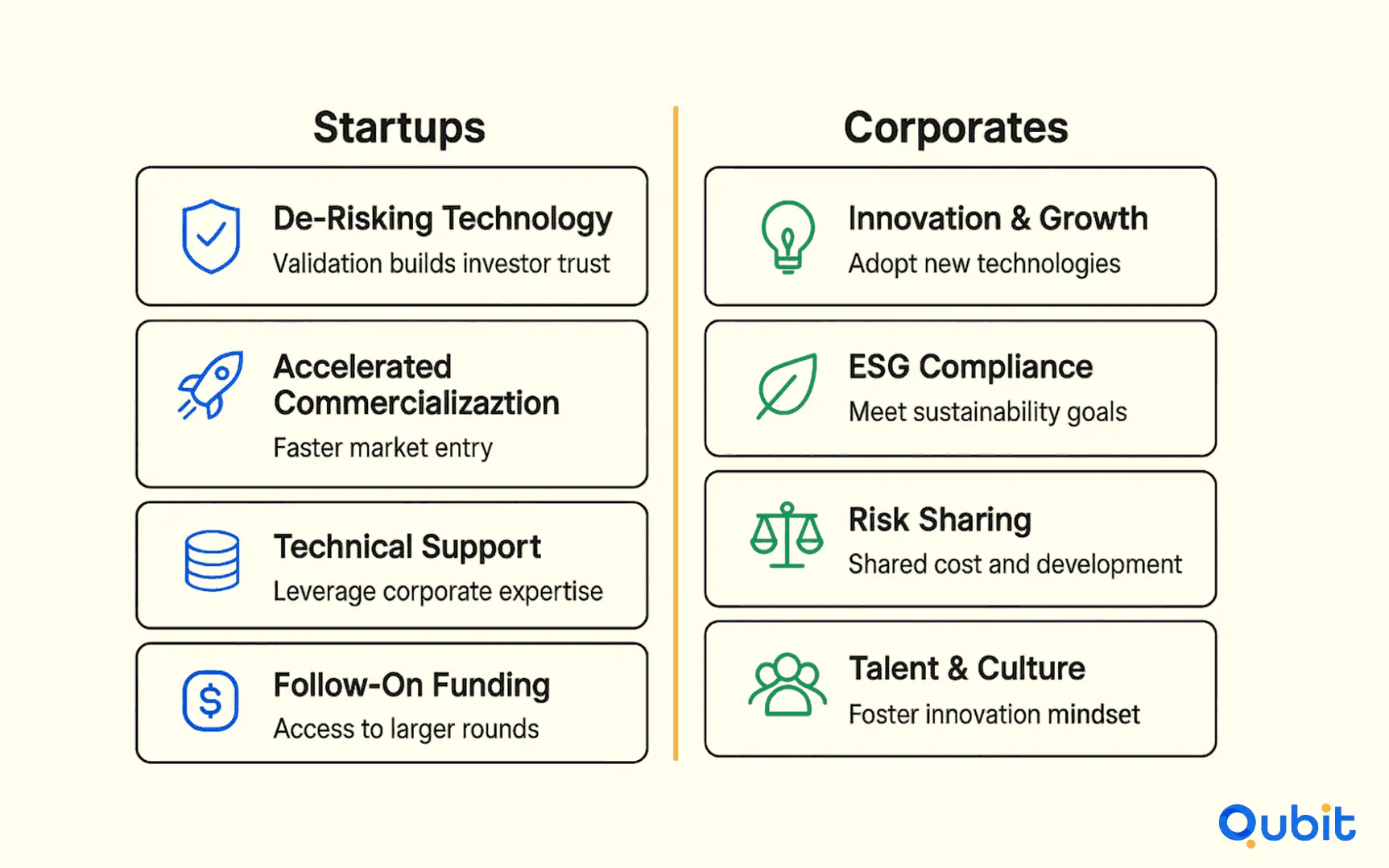The cleantech revolution is accelerating, but scaling breakthrough technologies from the lab to real-world impact remains one of the sector’s greatest challenges. Demonstration projects—those critical, first-of-a-kind deployments that prove a technology’s viability at scale—are often the most difficult to fund. In 2025, strategic corporate partnerships have emerged as a game-changing solution, unlocking capital, expertise, and market access that startups and innovators can rarely secure on their own.
This article explores how corporate partnerships are transforming the funding landscape for cleantech demonstration projects, the benefits and risks for both startups and corporates, and actionable strategies for building collaborations that drive the next wave of sustainable innovation.
Why Demonstration Projects Are So Hard to Fund
Demonstration projects are the bridge between promising prototypes and commercial-scale deployment. They are essential for validating new technologies, attracting follow-on investment, and convincing customers and regulators of real-world performance. Yet, these projects are notoriously capital-intensive and risky:
- High Upfront Costs: Building a demonstration-scale plant or system often requires tens of millions of dollars—well beyond the reach of most startups or early-stage investors.
- Uncertain Returns: With unproven technologies, there’s no guarantee of commercial success, making traditional lenders and VCs cautious.
- Long Timelines: Demonstration projects can take years to plan, build, and operate, tying up capital and resources for extended periods.
- Complex Stakeholder Management: These projects often require coordination with regulators, utilities, supply chain partners, and potential customers.
As a result, many promising cleantech innovations stall at the demonstration stage, unable to secure the funding and support needed to reach commercial scale.
The Rise of Strategic Corporate Partnerships
Corporates especially those in energy, utilities, manufacturing, chemicals, and transportation—are increasingly stepping up to bridge this gap. Their motivations are clear:
- Decarbonization Mandates: Corporates face mounting pressure from regulators, customers, and shareholders to cut emissions and adopt sustainable technologies.
- Innovation Pipeline: Partnering with startups gives corporates access to cutting-edge solutions and new business models.
- Competitive Advantage: Early adoption of breakthrough technologies can open new markets and revenue streams.
For startups, corporate partnerships offer more than just capital. They provide technical expertise, market validation, and access to infrastructure, customers, and global supply chains, resources that are often out of reach for young companies.
How Corporate Partnerships Work in Practice

1. Co-Investment and Joint Ventures
Corporates may co-invest alongside venture capitalists or public funders to share risks and rewards. In some cases, they form joint ventures with startups to develop, build, and operate demonstration projects.
2. Pilot and Demonstration Programs
Many large companies run formal pilot programs or innovation challenges, inviting startups to test their solutions in real-world settings. Successful pilots can lead to deeper partnerships, commercial contracts, or acquisition.
3. Access to Facilities and Infrastructure
Corporates can offer startups access to manufacturing plants, R&D centers, or customer networks, dramatically reducing the cost and complexity of demonstration projects.
4. Offtake Agreements and Market Access
By agreeing to purchase a startup’s product or service, such as clean hydrogen, renewable power, or advanced materials, a corporate partner can provide the revenue certainty needed to unlock additional funding.

Benefits for Startups
- De-Risking Technology: Validation by a major corporate partner signals credibility to other investors and customers.
- Accelerated Commercialization: Access to established distribution channels and customers speeds up market entry.
- Technical and Operational Support: Corporates bring deep domain expertise, supply chain relationships, and operational know-how.
- Follow-On Funding: Successful demonstration projects can lead to larger investments or acquisitions.
Benefits for Corporates
- Innovation and Growth: Access to new technologies and business models that can drive growth and sustainability.
- ESG and Regulatory Compliance: Partnerships help meet environmental, social, and governance (ESG) targets and regulatory requirements.
- Risk Sharing: By partnering with startups and other investors, corporates can share the risks and costs of technology development.
- Talent and Culture: Collaborating with startups fosters a culture of innovation and attracts top talent.
Real-World Examples
- Energy Majors and Hydrogen: Leading oil and gas companies are partnering with electrolyzer startups to build green hydrogen demonstration plants, leveraging their infrastructure and capital.
- Utilities and Grid Innovation: Utilities are piloting advanced battery storage, demand response, and grid management technologies in partnership with cleantech startups.
- Manufacturers and Circular Economy: Global manufacturers are working with recycling and materials startups to demonstrate new circular economy solutions at scale.
Cleantech startup fundraising strategies reveals a broad framework of funding dynamics, placing you within the context of both challenges and opportunities in the cleantech sector.
Building Successful Corporate Partnerships
To maximize the value of a corporate partnership, startups should:
- Align on Strategic Goals: Ensure both parties share a vision for the technology’s potential and the demonstration project’s objectives.
- Structure Clear Agreements: Define roles, responsibilities, intellectual property rights, and success metrics up front.
- Maintain Open Communication: Regular updates and transparent dialogue help navigate challenges and build trust.
- Leverage Ecosystem Support: Engage with accelerators, incubators, and industry forums that facilitate introductions and partnership-building.
Events and forums, such as those hosted by Greentown Labs and Clean Energy Trust, play a vital role in connecting startups with corporate partners, investors, and ecosystem stakeholders, fostering collaboration and unlocking new funding pathways.
Risks and Challenges
While corporate partnerships offer significant benefits, they are not without risks:
- Misaligned Expectations: Differences in pace, culture, or strategic priorities can derail partnerships.
- Intellectual Property Concerns: Startups must protect their core innovations while collaborating closely with larger organizations.
- Dependence on a Single Partner: Relying too heavily on one corporate can limit flexibility and bargaining power.
- Complex Decision-Making: Large corporates may have slow or bureaucratic processes that frustrate fast-moving startups.
Clear agreements, ongoing dialogue, and a focus on mutual benefit are essential to overcoming these challenges.
Conclusion
In 2025, the funding landscape for cleantech demonstration projects is more dynamic than ever. Governments, development banks, and philanthropies continue to play a role, but corporate partnerships are increasingly at the center of successful scale-up stories. New models—such as blended finance, milestone-based funding, and public-private partnerships—are emerging to further de-risk and accelerate the commercialization journey.
For cleantech startups, building relationships with corporates is now a strategic imperative. Those who can align innovation with industry needs, structure win-win agreements, and leverage the broader ecosystem will be best positioned to move from demonstration to deployment.
At Qubit Capital, we specialize in helping startups secure the funding they need to thrive. If you're ready to elevate your approach, explore our Fundraising Assistance service. Let us help you turn your vision into reality.
Key Takeaways
- Strategic corporate partnerships are vital for funding and scaling cleantech demonstration projects.
- Corporates provide startups with capital, technical expertise, and access to markets.
- Successful collaborations accelerate commercialization and validate new technologies.
- Events and industry forums help connect startups with the right corporate partners.
- Clear alignment on goals and structured agreements are essential for partnership success.
Frequently asked Questions
Why are corporate partnerships important for funding cleantech demonstration projects?
Corporate partnerships bring more than just funding—they offer technical resources, industry know-how, and access to established customer bases, making it easier for startups to validate and scale their solutions.


 Back
Back



